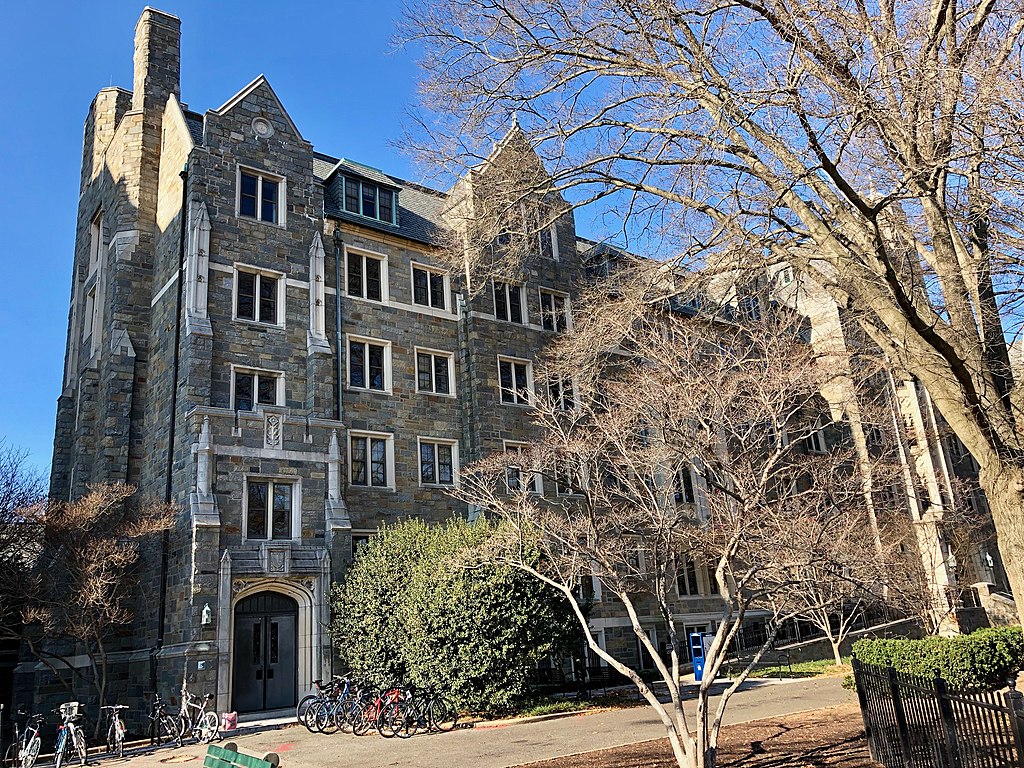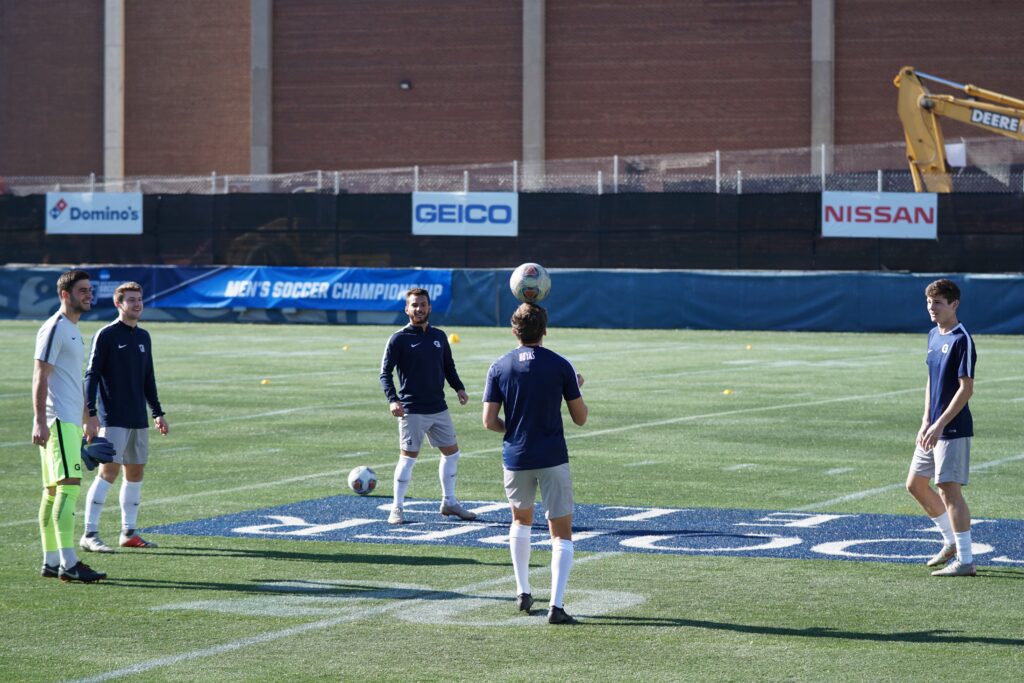
Why is Georgetown University club culture important?
When you first begin the process of putting together the list of your dream schools, you will likely prioritize things like the diversity of majors and minors, the availability of study abroad programs or combined B.A./M.A. degrees, and university rankings. After you’ve narrowed down your search to a few dozen colleges, however, you’ll be faced with the daunting prospect of deciding where you could see yourself for the next four years of your life.
This is where taking a closer look at extracurricular offerings at different colleges will be a huge help in making a decision. Getting a clear sense of club culture at the college of your choice—and the extent to which it affects your social life on campus—can give you much-needed perspective in the college selection process.
This informational essay was written by Tamara Evdokimova, Georgetown ’19. If you want to get help writing your Georgetown application essays from Tamara or other CollegeAdvisor.com Admissions Experts, register with CollegeAdvisor.com today.
What makes club culture at Georgetown unique?
When I first arrived at Georgetown’s campus five years ago, I was overwhelmed by the endless row of tables at the campus activity fair during orientation week. From dozens of intramural sports to numerous student publications to a multitude of social and political activist groups, Georgetown boasts nearly 400 undergraduate student organizations, according to its website. What makes Georgetown unique (and, to be honest, unusual) among its peer institutions is the pre-professional nature of its club culture.

At a typical college activities fair, you would browse the tables of various student groups, sign up for as many as you wanted to, and wait to receive an email about how to join or drop in on events. At most schools, the majority of student groups don’t have an application or interview process beyond regular attendance. At Georgetown, however, adding your name to that sign-up sheet is only the beginning of an arduous selection process, often involving written applications and several rounds of interviews.
To join a student organization at Georgetown as a general member, you need to put together an application, (often, though not always) sit in for an interview, and then be accepted or rejected by the leadership of the club. In fact, club culture at Georgetown is so professionally oriented that we don’t call any of these groups “clubs”—we call them organizations.
The advantages of club selectivity at Georgetown
Like most freshmen at Georgetown, I was overwhelmed and frankly bewildered by the many hoops I had to jump through in order to write columns for the student paper or sell bagels at the student coffee shop. Every organization I expressed a vague interest in joining inundated me with questions about my past leadership experience, my spirit animals, my character flaws, and my biggest fears. There were Google Forms to fill out, essays to write, and 15-minute interview slots to sign up—all in the first weeks of September. When you showed up to student organization interviews, you were often expected to be dressed in business attire, have a printed copy of your resume on hand, and have mastered the perfect firm handshake.

Although this can feel intimidating, failure is in the nature of the process. (Ask any Georgetown student and they’ll have a story about club selection). Here are a few examples of my successful and not-so-successful attempts to partake in club culture during my first year:
- A student publication focused on international affairs asked me to pick one person who I would call if I were marooned on a deserted island, with only 10 minutes to explain my whereabouts. I chose Vladimir Putin, was accepted to write for the Eastern Europe & Russia section, and spent the next 4 years living out of The Caravel’s office as writer, editor, and Editor-in-Chief;
- At an interview for the campus coffee shop, I was placed in a cramped chair in a basement classroom in front of a panel of interviewers and asked to discuss a time I epically failed at something. I epically failed that interview and never did sell bagels to the student body;
- While I was scribbling my name on a sign-up sheet for what was essentially the college version of Model UN, a board member insinuated that attending a party the group was hosting in a few days would really help my acceptance chances. I skipped the party and didn’t make it into the organization during that application round.
As stressful as some of those applications experiences felt at the time, Georgetown’s club culture is, hands down, the best preparation I’ve ever received for internship and job hunting.

By the time the thought of seeking a summer internship crossed my mind during my freshman spring, I had perfected my elevator pitch, polished my resume (and added a few leadership positions to boot), and learned to cope with interview nerves. I was prepared to answer every curveball interview question under the sun because I had answered them….when applying to work as a residential assistant, to knock on doors for a presidential campaign, and to man the welcome desk at an on-campus research center. Another unexpected benefit of club interviews was my early investment in a pencil skirt and blazer that accompanied me to every job interview until I graduated.
Most upperclassmen at Georgetown will lament the intense selection process for what are, after all, only student organizations. But they will also concede that chasing down the coveted spot at an organization of their choice is great practice for the rigors of job hunting come senior spring.

The downsides of club culture at Georgetown
This is a good time to point out that Georgetown University does not officially sanction Greek life on campus, citing its incompatibility with the University’s Jesuit values. Nonetheless, ‘unofficial’ sororities and fraternities do exist, though they receive no university funding. Because the Greek life landscape is relatively bleak, student organizations at Georgetown have in many ways taken on the social function often reserved for Greek life.
Even pre-professional groups like the pre-law society or off-campus volunteer groups organize social mixers, holiday events, and, yes, parties. As with traditional Greek societies, however, with some social events comes exclusivity. It’s not uncommon to witness ‘club members only’ events across campus.

Though it’s an understandable impulse to socialize with those students who share your extracurricular interests, the highly selective club admissions process means that some students are left with no organizations to participate in and thus few social events to attend.
For a freshman, this can be a daunting prospect. The good news is that with almost 400 organizations to choose from and apply to, you can certainly find one that will be a great fit. Throughout my undergraduate education, I never met anyone who, in their 4 years at Georgetown, didn’t successfully join at least one student organization. It’s important to note that for some student organizations, the application process is a mere formality—you fill in a quick form and answer questions about yourself, show up to a meeting when free pizza is promised, and you’re in. Each organization is unique in its mindset and its view on application selectivity. The student newspaper I mentioned writing for? It turned out that they accepted everyone who submitted a complete application that year.

Clubbing like a Hoya
The emphasis on selectivity in student organizations sets Georgetown apart from many of its peer institutions, and can undoubtedly make you feel uneasy after a grueling season of applying to colleges. If you decide that Georgetown is the best place for you, being aware of this particular aspect of campus culture can help you mentally prepare for the process.
For example, you can begin browsing the list of existing organizations over the summer and select a few that resonate with your interests. Following organizations on social media is a great way to learn about their culture and get a heads up when applications open. Many accounts even share application tips from current members!
At the end of the day, the key is to remember that there are always like-minded groups where you’ll be a great fit, whose members are more than happy to answer your burning questions during that first interest meeting in September. And it might be a good idea not to toss out your Common App resume just yet.

This informational essay was written by Tamara Evdokimova, Georgetown ’19. If you want to get help writing your Georgetown application essays from Tamara or other CollegeAdvisor.com Admissions Experts, register with CollegeAdvisor.com today.
